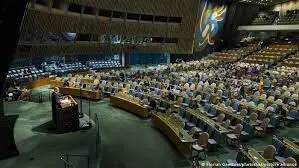
Can the United Nations be a meaningful body?
text_fieldsAfter a gap of two years, the General Assembly of the United Nations started meeting on Tuesday. Due to covid restrictions, only online meetings were held during this interval. The Russia-Ukraine battleground is the major concern in this year's conference, which will be attended by around 150 heads of state and senior leaders from 193 member states. However, the main party, Russian President Vladimir Putin, is not attending the conference. Ukrainian President Volodymyr Zelensky also won't be in attendance. However, a pre-recorded speech by Zelensky was approved by a majority of members over Russia's objections - since there is no veto power in the General Assembly like in the Security Council. Chinese President Xi Jinping is also not coming to the UN headquarters.
77 years after the establishment of the United Nations in 1945, it is facing a series of complex and serious crises like never before. The main reproach about the world body is that it is not doing the best it can within its constraints, to alleviate crises. Even during the Ukraine-Russia war, the attempt to negotiate bilaterally in favour of peace did not bear fruit. It is not forgotten that Secretary-General Antonio Guterres went to Ukraine in April to try to rescue soldiers and civilians trapped in the city and worked with Turkish President Recep Tayyip Erdogan to arrange the export of key food grains through Ukrainian ports.
Also read: Izium mass grave of 440: Ukrainians search for dead relatives
The UN has also failed to address global food shortages caused by the war in Ukraine and civil conflicts in Syria and Ethiopia. As an international dispute resolution forum, the UN has not attempted to deal with escalation of US-China tensions or the newly emerging Cold War-like situation between the allies of either. The UN has been helpless too in the face of China, despite Chinese authorities' crackdown and persecution of the Uyghur Muslim minority in China's Xinjiang province which has been garnering international attention. The long-awaited 45-page report on torture did not even use the word 'genocide'. There is no evidence that the UN has done much about the persecution of Rohingya Muslims in Myanmar or the misery of of Rohingya refugees. It also could not do anything about the military that overthrew democracy in Myanmar. It is also pointed out that after 2007, the UN has not been ready to even table a resolution against Myanmar.
Also read: UN report calls China's torture of Uyghur Muslims as "crime against humanity
UN peacekeeping missions have also failed to save civilian lives in conflict-ridden countries such as Mali, Congo, and Ethiopia - the Tigray war in Ethiopia has killed five lakh people in two years and created a huge refugee problem, but again, the UN could not do anything. On the ever burning Palestine issue, ever since 1948, the UN's efforts to resolve the issue have been limited to passing resolutions. Perhaps the most prominent 'contribution' the UN has made is Israel - A Zionist state which did not even bother to honour Resolution 242 after the 1967 Six-Day War, calling to withdraw from newly captured land. The subsequent Non-Alignment Resolutions were also ignored.
Also read: Allow humanitarian organisations to work in Palestine, says UN to Israel
Amidst all this, some silver linings in the recent history of the UN that cannot be overlooked. One of them is the effort to bring together rival factions in Yemen, where the long-running civil war finally brought a truce that has been holding. The international organisation also took small steps to address the humanitarian crisis in Afghanistan after the US withdrawal. However, the contributions of the United Nations to global issues do not merit laudatory mention. As global warming and climate change loom over the human race, the UN should have taken the initiative to take decisive action on these threats, especially when it is observed that wars and weapons production are the biggest threats to the climate.
Also read: World's wealthy countries are destroying children's environments globally: UNICEF
The main problem of the United Nations has always been its structural weaknesses, such as the hegemony of the five permanent members with veto power - China, France, Russia, the UK, and the US. These big powers often say that structural reforms can be considered. But when it comes to the brass tacks, they themselves become obstacles. Countries like India and Japan have been demanding that the number of permanent members should be increased. If accepted, it may open the way for more diverse approaches and discussions to some extent. However, we cannot expect much from a system that assumes that those who cause problems will be ready to take action against themselves.























